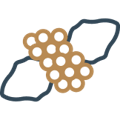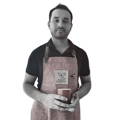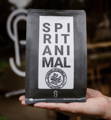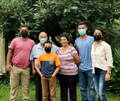The Cup of Excellence 2021 Honduras is a competition and auction for the highest quality coffees. This event is important because it rewards the farmers who work hard to produce the best coffee beans. The money raised from this event goes towards helping these farmers, which incentivizes and motivates them to continue producing high-quality coffee beans.
CUP OF EXCELLENCE 2021 HONDURAS:
AN INTERVIEW WITH GARY URRUTIA


The Cup of Excellence (COE) is an annual international competition that recognizes the best coffee growers in the world. Kathya Irias, President & Founder of Spirit Animal Coffee, interviewed Gary Urrutia, COE's newly appointed interim Managing Director.
In this interview, Gary, a proud catracho, shares his insights on this year’s outstanding achievements of Honduran coffee contestants, the auctioning process, what it takes for a farmer to become part of it, and his outlook on the bright future of Honduran specialty coffee.
"Winning in Cup of Excellence is anything but simple. We want to make sure only the best coffees reach that hallmark."
"Winning in Cup of Excellence is all but simple. We want to make sure only the best coffees reach that hallmark."
THE INTRO
Kathya: Hi Gary, welcome to Spirit Animal Coffee Shop & Lab – again! The last time we met was at our flagship Coffee Shop & Lab opening here in San Pedro Sula, Honduras.
Gary: Hi Kathya, thank you for having me here again. It fills me with joy to see how Hondurans can do great things, like you guys at Spirit Animal. Such a beautiful store and a powerful mission – changing how coffee is perceived in Honduras. How innovative you are and offering this incredible coffee to our fellow Hondurans. Coffee that, just some time ago, was only intended for international markets. And today you can buy it here, in your shop. It’s amazing.
Kathya: Well, thank you for accepting the invitation, and being with us, because yes: the idea behind our conversation today is to share information and knowledge. Answer things like:
What does Cup of Excellence stand for, and what is its mission?
What does it mean to be part of a Cup of Excellence?
HOW DID THE COE START?

Gary Urrutia, COE's newly appointed interim Managing Director
Gary: To give a bit about the context: the Cup of Excellence program was born in Brazil in 1999 because, at that time, it was already common practice to mix high-quality coffee like single-origin with mediocre coffee beans. So our founder, Susie Splinder, said to herself: “I need a program that recognizes quality.”
Today, the Cup of Excellence program has spread rapidly, becoming present in 12 countries and regions, such as Tanzania, Taiwan, and Hawaii.
THE CUP OF EXCELLENCE EVALUATION PROCESS
Winning in Cup of Excellence is all but simple. We want to make sure only the best coffees reach that hallmark.
That is why our program is divided into stages. The first stage is where Honduran producers can visit us here in Honduras and share a sample of their coffee. This sample is evaluated by the panel of coffee cuppers led by an internationally recognized q-grader.
This panel, usually formed by 10 to 15 tasters, selects a sample. The best ones then go to the next stage: the National Jury evaluation. At this time, the coffee farmer must send the samples to the designated warehouse, which is done to safeguard the physical integrity of the batch. The coffee farmers have already delivered their coffee samples, which means their coffees have already received a cup score.

Paul & Kathya, Spirit Animal Coffee's CEO and President, with Gary at the opening of Spirit Animal's flagship coffee shop & lab in San Pedro Sula, Honduras.
Kathya: Coffee producers often ask us: is there a minimum quantity that they have to harvest to enter the program?
Gary: We do not put a minimum size of the farm. Instead, we put a maximum of samples per coffee producer and only 2 farms per producer. Regarding minimum size per batch, we essentially require a minimum of 4 69-kg bags. Anything lower than that would make it difficult to process and dispatch.
Kathya: I imagine that this is tied to the logistics since the coffee entering the COE hallmark is being sent worldwide.
Gary: Precisely. And that is another of our advantages. We send coffee samples worldwide, so the coffee producers have the advantage that their coffee will be presented to more than 90 companies.
So the coffee is not just participating at an auction “exhibition,”; but its sample is sent to potential buyers. And these potential buyers tend to ask for the same producer in the future once they’ve tried a specific batch.
“It's not just about participating at an “exhibition.” Coffee samples are sent to potential buyers. And these buyers tend to ask for the same producer in the future once they’ve tried a specific batch.”
Kathya: Agreed. And that’s the part that I appreciate the most of your work: marketing and promoting our coffee farmers to the world. Because that’s essentially what you do: enable.
When you send these samples to more than 90 potential buyers, many of them fall so much in love with the product of Honduras, the producer, and the process and the quality of this coffee, that they say: “I want to buy directly from the farmer in the future, not only through auctions.” And that is where the synergy begins, where businesses start buying directly from the producer.
That was also one of the reasons why our Spirit Animal was born: to support the coffee producers. So that part is something many are also unaware of. When they enter the Cup of Excellence, that is what happens: their name begins to be heard, their coffee begins to be tested by many international palates, which opens a large number of doors.
When you mentioned that international round, how many countries are you sending the Cup of Excellence competitor samples to?

89.6-score Parainema from Finca El Rubi, one of the winners of 2021 Cup of Excellence Honduras.
Gary: We ship samples in two stages. The first stage is in the international jury. Previously (before COVID-19), the judges from all over the world came to Honduras. We hope we can go back to that, but for the moment, we send these coffee samples to an international jury of 16 judges from 9 different countries around the world.
This step is the first part to ensure the best coffee gets to the next stage. After this step, we sold more than 100 samples to 93 potential buyers around the world. I can’t give you an exact number, but certainly, they were sent to more than 15 countries.
Kathya: Including here
Gary: Yes, we left a sample in Honduras, too.
Kathya: We had two rounds of tasting where we invited the public to come to be part of this coffee cupping process. I believe that many were unaware that these were the same coffees that were traveling thousands of kilometers to be tasted by the most demanding palates worldwide.
So this is for us, as a company, one of the most beautiful gifts: to be able to share this with our fellow Hondurans make them try all these truly extraordinary coffees.
Gary: Indeed, it’s extraordinary because if we think about the judges who selected this sample that we have here, we have a judge from the United States, Spain, South Korea, Australia, Norway, Japan. There are so many countries where this coffee was cupped to then become selected for the final run.
COE: WHAT IT'S LIKE PARTICIPATING AS A BUYER

At Spirit Animal, we were one of the few "white crows" among the participants: a local Honduran brand bidding for our local best coffees. Here is the coveted 89.6-score Parainema, roasted to perfection, and ready to be savored by our customers.
Kathya: Speaking of this international aspect of the process, I must say that it was a fantastic experience for us as a business to have participated. Because through the auction, we were also able to meet companies with the same vision and values, give a fair price to the producer, a price where the producer feels supported in the process that they are doing. It was very lovely to share insights with businesses from the United States, the United Arab Emirates, Australia.
And you know this from us already: Paul (Spirit Animal’s CEO) was stressed for almost 24 hours because every time the auction was going to close for this lot, someone would come in and bid a little more. Finally, he said: “I can’t take it anymore!” But at the same time, it was the most exciting part for us.
So it’s an immense joy for us. Obviously, as a company, we cannot support all producers, but seeing that circle and seeing what happens within this organization is beautiful. Because you witness how those coffee producers’ lives change in an instant – not just financially, but also educationally speaking. Because now they see that all their hard work has borne results.

El Rubí Farm, located at 1,400m in Santa Bárbara Department, is owned by Jennifer Iveth Madrid Chavez. Heading this little family business, Jennifer manages to grow outstanding coffees, and with a keen eye for mindful upcycling and coffee farming practices.
HONDURAS COE 2021: RECORD-BREAKING RESULTS
Gary: Indeed. Speaking of numbers, we sold 460 thousand dollars in the Honduras Cup of Excellence auctions alone. In other words, we generated almost half a million US dollars for producers here in Honduras. And also obtained the highest price per pound among all Central American countries.
Kathya: Right. Because many people say: “Ah, but if you buy the coffee at such a price, how much is this coffee going to cost me as the final customer?” Because, of course, there is logistics, roasting, packaging, and so on. Clearly, there are additional expenses. For example, we ran a giveaway at our coffee shop here in San Pedro Sula for this COE winner, and people saw that it has a cost of 1650 Honduran lempiras, VAT included, which is about 68 US Dollars.
And many said: “What?! 1650 lempiras for a 340-gram bag of coffee?”
And this is the reason why I wanted to have a conversation with you, Gary. Because many don’t know that, in Central America, we were among those who had the highest price per pound of coffee auctioned.
It proved that, at an international level, people who tasted this coffee know how extraordinary our coffee is, and that’s why the auction prices skyrocketed. And many people do not see the value that there is in these coffees and that it’s not the price we as a company decide to give it.
In fact, it’s one of those “taboo” topics out there because, in the end, we are in a country where the economic situation is not such where everyone can spend almost $70 for a bag of coffee.
But it’s important to understand what this coffee entails, how it changes the life of its farmer, and how it connects the farmer and the buyer who values the quality and the process. We are trying to do that at the company level, too. So for us, being part of the Cup of Excellence allows us to share that vision, the mission, and the values and support coffee farmers in this way.
And it’s is something very nice to recognize that we can be proud of the coffee that is coming out of our mountains, our regions. They are spectacular coffees, desired and coveted overseas in an extraordinary way.
So, Gary, please continue with the excellent work and the determination, supporting the producers and sharing the message that they can participate in this process, get involved. And also, here at our coffee shop, we can direct anyone interested in getting to the right people at your organization who can give all the information on how to participate next year.
And speaking of this, I wanted to ask you on behalf of all those interested in participating in the next year’s Cup of Excellence.
How, when, and where does the process begin? What are the key dates to keep in mind?
Gary: Well, as you say, we are a non-profit organization, and our main drive is to get the coffee farmers a fair price for their produce. And, of course, we invite everyone in Honduras to participate. At this moment, we are still defining the date for next year. So I invite you to stay tuned via social networks for announcements by IHCAFE, our Honduran Coffee Institute. We invite all Honduran producers to participate so that their coffee can be commercialized, and that they can obtain a fair price, and allow the Cup of Excellence to change their lives. It’s an opportunity that shouldn’t be missed.
Kathya: Gary, thank you for these words. And to finish, I’d like to say to everyone who comes here to our coffeeshop: that enjoying the coffee we offer here isn’t just about a trendy concept.
And many times, we think: “what can I do to improve the situation in my country?” Well, interestingly enough, it can be something simple as having a different cup of coffee. Because with every sip, you motivate and support every coffee farmer whose precious beans are available at our store.
So thank you, and we look forward to welcoming you again at our Coffee Shop here in San Pedro Sula.

The Cup of Excellence (COE) is an annual international competition that recognizes the best coffee growers in the world. Kathya Irias, President & Founder of Spirit Animal Coffee, interviewed Gary Urrutia, COE's newly appointed International Director.
In this interview, Gary, a proud catracho, shares his insights on this year’s outstanding achievements of Honduran coffee contestants, the auctioning process, what it takes for a farmer to become part of it, and his outlook on the bright future of Honduran specialty coffee.
Subscribe
Sign up to find out about our deals and new coffees.
No spamming, just virtual hugs.
"After 250 hours of research and testing, including interviewing five baby wearing experts and walking over 100 miles in 15 wraps, slings, and meh dais, we think that the Gemlak Baby Carriers is the best"
"After 250 hours of research and testing, including interviewing five baby wearing experts and walking over 100 miles in 15 wraps, slings, and meh dais, we think that the Gemlak Baby Carriers is the best"
AN INTRO TO THE CUP OF EXCELLENCE ORGANIZATION
Kathya: Hi Gary, welcome to Spirit Animal Coffee Shop & Lab – again! The last time we met was at our flagship Coffee Shop & Lab opening here in San Pedro Sula, Honduras.
Gary: Hi Kathya, thank you for having me here again. It fills me with joy to see how Hondurans can do great things, like you guys at Spirit Animal. Such a beautiful store and a powerful mission – trying to change how coffee is perceived in Honduras. How innovative you are and offering this incredible coffee to our fellow Hondurans. Coffee that, just some time ago, was only intended for international markets. And today you can buy it here, in your shop. It’s amazing.
Kathya: Well, thank you for accepting the invitation, and being with us, because yes: the idea behind our conversation today is to share information and knowledge. Answer things like:
What does Cup of Excellence stand for, and what is its mission?
What does it mean to be part of a Cup of Excellence?
So let’s start. Could you please explain the process for a coffee to enter the Cup of Excellence program?
Gary: To give a bit about the context: the Cup of Excellence program was born in Brazil in 1999 because, at that time, it was already common practice to mix high-quality coffee with mediocre coffee beans. So our founder, Susie Splinder, said to herself: “I need a program that recognizes quality.”
Today, the Cup of Excellence program has spread rapidly, becoming present in 12 countries and regions, such as Tanzania, Taiwan, and Hawaii.
Winning in Cup of Excellence is all but simple. We want to make sure only the best coffees reach that hallmark.
That is why our program is divided into stages. The first stage is where Honduran producers can visit us here in Honduras and share a sample of their coffee. This sample is evaluated by the panel of coffee cuppers led by an internationally recognized q-grader.
This panel, usually formed by 10 to 15 tasters, selects a sample. The best ones then go to the next stage: the National Jury evaluation. At this time, the coffee farmer must send the samples to the designated warehouse, which is done to safeguard the physical integrity of the batch. The coffee farmers have already delivered their coffee samples, which means their coffees have already received a cup score.

Kathya: Coffee producers often ask us: is there a minimum quantity that they have to harvest to enter the program?
Gary: We do not put a minimum size of the farm. Instead, we put a maximum of samples per coffee producer and only 2 farms per producer. Regarding minimum size per batch, we essentially require a minimum of 4 69-kg bags. Anything lower than that would make it difficult to process and dispatch.
Kathya: I imagine that this is tied to the logistics since the coffee entering the COE hallmark is being sent worldwide.
Gary: Precisely. And that is another of our advantages. We send coffee samples worldwide, so the coffee producer has the advantage that his coffee will be captured by more than 90 companies.
So the coffee is not just participating at an auction “exhibition,”; but its sample is sent to potential buyers. And these potential buyers tend to ask for the same producer in the future once they’ve tried a specific batch.
Kathya: Agreed. And that’s the part that I appreciate the most of your work: marketing and promoting our coffee farmers to the world. Because that’s essentially what you do: enable.
When you send these samples to more than 90 potential buyers, many of them fall so much in love with the product of Honduras, the producer, and the process and the quality of this coffee, that they say: “I want to buy directly from the farmer in the future, not only through auctions.” And that is where the synergy begins, where businesses start buying directly from the producer.
That was also one of the reasons why our Spirit Animal was born: to support the coffee producers. So that part is something many are also unaware of. When they enter the Cup of Excellence, that is what happens: their name begins to be heard, their coffee begins to be tested by many international palates, which opens a large number of doors.
When you mentioned that international round, how many countries are you sending the Cup of Excellence competitor samples to?
Gary: We ship samples in two stages. The first stage is in the international jury. Previously (before COVID-19), the judges from all over the world came to Honduras. We hope we can go back to that, but for the moment, we send these coffee samples to an international jury of 16 judges from 9 different countries around the world.
This step is the first part to ensure the best coffee gets to the next stage. After this step, we sold more than 100 samples to 93 potential buyers around the world. I can’t give you an exact number, but certainly, they were sent to more than 15 countries.
Kathya: Including here
Gary: Yes, we left a sample in Honduras, too.
Kathya: We had two rounds of tasting where we invited the public to come to be part of this coffee cupping process. I believe that many were unaware that these were the same coffees that were traveling thousands of kilometers to be tasted by the most demanding palates worldwide.
So this is for us, as a company, one of the most beautiful gifts: to be able to share this with our fellow Hondurans make them try all these truly extraordinary coffees.

Kathya: Including here
Gary: Yes, we left a sample in Honduras, too.
Kathya: We had two rounds of tasting where we invited the public to come to be part of this coffee cupping process. I believe that many were unaware that these were the same coffees that were traveling thousands of kilometers to be tasted by the most demanding palates worldwide.
So this is for us, as a company, one of the most beautiful gifts: to be able to share this with our fellow Hondurans make them try all these truly extraordinary coffees.
Gary: Indeed, it’s extraordinary because if we think about the judges who selected this sample that we have here, we have a judge from the United States, Spain, South Korea, Australia, Norway, Japan. There are so many countries where this coffee was cupped to then become selected for the final run.
Kathya: Speaking of this international aspect of the process, I must say that it was a fantastic experience for us as a business to have participated. Because through the auction, we were also able to meet other companies that have the same vision and values, give a fair price to the producer, a price where the producer feels supported in the process that they are doing. It was very lovely to share insights with businesses from the United States, the United Arab Emirates, Australia.
And you know this from us already: Paul (Spirit Animal’s CEO) was stressed for almost 24 hours because every time the auction was going to close for this lot, someone would come in and bid a little more. Finally, he said: “I can’t take it anymore!” But at the same time, it was the most exciting part for us.
So it’s an immense joy for us. Because obviously, as a company, we cannot support all producers, but seeing that circle and seeing what happens within this organization is beautiful. Because you witness how those coffee producers’ lives change in an instant – not just financially, but also educationally speaking. Because now they see that all their hard work has borne results.

Gary: Indeed. Speaking of numbers, we sold 460 thousand dollars in the Honduras Cup of Excellence auctions alone. In other words, we generated almost half a million US dollars for producers here in Honduras. And also obtained the highest price per pound among all Central American countries.
Kathya: Right. Because many people say: “Ah, but if you buy the coffee at such a price, how much is this coffee going to cost me as the final customer?” Because, of course, there is logistics, roasting, packaging, and so on. Clearly, there are additional expenses. For example, we ran a giveaway at our coffee shop here in San Pedro Sula for this COE winner, and people saw that it has a cost of 1650 Honduran lempiras, VAT included, which is about 68 US Dollars.
And many said: “What?! 1650 lempiras for a 340-gram bag of coffee?”

And this is the reason why I wanted to have a conversation with you, Gary. Because many don’t know that, in Central America, we were among those who had the highest price per pound of coffee auctioned.
It proved that, at an international level, people who tasted this coffee know how extraordinary our coffee is, and that’s why the auction prices skyrocketed. And many people do not see the value that there is in these coffees and that it’s not the price we as a company decide to give it.
In fact, it’s one of those “taboo” topics out there because, in the end, we are in a country where the economic situation is not such where everyone can spend almost $70 for a bag of coffee.
But it’s important to understand what this coffee entails, how it changes the life of its farmer, and how it connects the farmer and the buyer who values the quality and the process. We are trying to do that at the company level, too. So for us, being part of the Cup of Excellence allows us to share that vision, the mission, and the values and support coffee farmers in this way.
And it’s is something very nice to recognize that we can be proud of the coffee that is coming out of our mountains, our regions. They are spectacular coffees, desired and coveted overseas in an extraordinary way. So
Gary, please continue with the excellent work and the determination, supporting the producers and sharing the message that they can participate in this process, get involved. And also, here at our coffee shop, we can direct anyone interested in getting to the right people at your organization who can give all the information on how to participate next year.
And speaking of this, I wanted to ask you on behalf of all those interested in participating in the next year’s Cup of Excellence.
How, when, and where does the process begin? What are the key dates to keep in mind?
FAQ
What is Cup of Excellence Coffee?
How can I get a Cup of Excellence coffee?
Always look for the special COE badge. Only coffees participating in an auction are allowed to carry it. Better still, look for the micro-lots which the COE publishes on their website. And if you're in to try a 2021 winner, we've got one here for you.
What makes a coffee become specialty-grade?
To be labeled as specialty, coffee must achieve 80 points or higher on the SCA cupping scale. To learn more about how this works, go to our coffee quality score information page.


